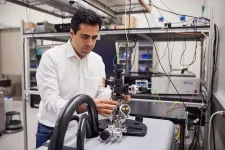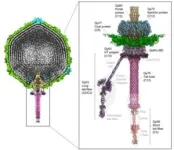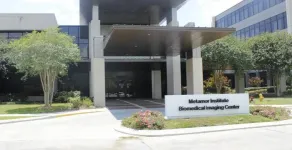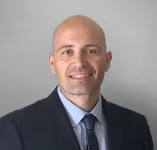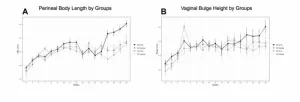(Press-News.org) NORMAN, OKLA. – Alisa Javadi, Ph.D., professor at the University of Oklahoma School of Electrical and Computer Engineering and the Homer L. Dodge Department of Physics and Astronomy, has received funding from the U.S. Department of Energy Early Career Research Program for research that offers the potential for advancing quantum technology development.
Javadi’s research will test the use of cerium oxide as a host for quantum bits, or qubits. Qubits, the building blocks of quantum computing, need an environment free of magnetic noise to function properly. Isotopic purification, which removes magnetic nuclei, is the only guaranteed solution, but it is costly. Currently, diamond is the leading material for quantum emitters. However, diamonds are expensive and contain magnetic carbon atoms, which require further isotopic purification.
Javadi’s project explores a promising alternative. Cerium oxide is made of cerium and oxygen, which both lack magnetic nuclei. By providing a noise-free environment, it is an ideal candidate for hosting qubits. Javadi says that this project will contribute to the progress of photonic quantum technologies and that these discoveries could significantly impact a broad range of disciplines, such as secure communication technologies and biology.
The study's first phase will focus on identifying color centers, or optically active quantum bits, and understanding their properties. Color centers are typically arrangements of extrinsic atoms in the host, atoms that are not native to the host. The team will use theoretical studies to narrow the search for the right combination of these atoms to a handful of candidates. They will then grow the host crystals through pulsed laser deposition, a technique that allows for testing with short turnaround times. The team will then conduct room-temperature and cryogenic studies to test the photon emission from these color centers and validate the theoretical predictions.
The project will also explore the role that geometry plays in the optical emission of ensembles of emitters. One phenomenon of interest is superradiance, where quantum emitters work collectively to generate bursts of energy. Javadi will compare how geometry influences superradiance in different forms of arrangement of emitters, including a three-dimensional crystal and a two-dimensional sheet.
Javadi earned his doctoral degree from the Niels Bohr Institute at the University of Copenhagen. He was a postdoctoral researcher at the University of Copenhagen and at the University of Basel. He has received a European Research Council Starting Grant and the Marie Skłodwska-Curie Postdoctoral Fellowship from the European Commission. His research interests include quantum sensing, communication and quantum light sources.
Learn more about Javadi’s research group here.
END
Javadi receives DOE Early Career Award to study qubit hosts
2024-10-22
ELSE PRESS RELEASES FROM THIS DATE:
Obesity Medicine Fellowship created at Pennington Biomedical
2024-10-22
Obesity Medicine Fellowship Created at Pennington Biomedical
Fellowship product of collaboration between Pennington Biomedical Research Center’s Metamor Clinic and Louisiana State University Health New Orleans School of Medicine
FOR IMMEDIATE RELEASE
Oct. 22, 2024
BATON ROUGE – A new Obesity Medicine Fellowship at Pennington Biomedical Research Center is now open for candidate applications. The one-year program is the result of a collaboration between Pennington Biomedical and Louisiana State University Health ...
Structural biology analysis of a Pseudomonas bacterial virus reveals a genome ejection motor
2024-10-22
BIRMINGHAM, Ala. – The viruses that infect bacteria are the most abundant biological entities on the planet. For example, a recent simple study of 92 showerheads and 36 toothbrushes from American bathrooms found more than 600 types of bacterial viruses, commonly called bacteriophages or phages. A teaspoon of coastal seawater has about 50 million phages.
While largely unnoticed, phages do not harm humans. On the contrary, these viruses are gaining increasing popularity as biomedicines to eradicate pathogenic ...
Remote tool developed to helped detect autism and developmental delay in children with limited access to specialists
2024-10-22
A Ukrainian researcher has developed a new digital tool for detecting autism and developmental delay in children. Her research has been published in Cambridge University Press journal Cambridge Prisms: Global Mental Health.
The tool incorporates the basic principles of the Kids’ Development Diagnosis and Determining the Risk of Autism (KiDD) methodology, for children aged 1.5 to 6 years old, into mobile app form. It has the potential to help diagnose children more swiftly and efficiently, which could have major positive ...
Texas Accounting Chair Steven Kachelmeier garners coveted award for scholarship
2024-10-22
Texas Accounting Chair Steven Kachelmeier Garners Coveted Award for Scholarship
AUSTIN, Texas — The American Accounting Association (AAA) presented its Lifetime Achievement Award for Behavioral Accounting Research to Steven Kachelmeier, a professor and chair of the Department of Accounting at The University of Texas McCombs School of Business. Kachelmeier, the Thomas O. Hicks Endowed Chair in Business, accepted this prestigious award during the weekend at the association’s 2024 Accounting ...
CABHI launches funding program that ignites innovation to advance healthy aging
2024-10-22
TORONTO, Oct. 22, 2024 – Today, the Centre for Aging + Brain Health Innovation (CABHI), powered by Baycrest launched Ignite, its new funding program to support Canadian innovators designing solutions for older persons. As Canada’s aging population rapidly grows – with nearly 20 per cent of people above the age of 65 – so too will the need for innovations that enhance the lives of older persons, including those impacted by dementia.
Canadian early-stage innovators – including researchers, point-of-care staff, and companies – are developing ...
A fully automated AI-based system for assessing IVF embryo quality
2024-10-22
A new artificial intelligence-based system can accurately assess the chromosomal status of in vitro-fertilized (IVF) embryos using only time-lapse video images of the embryos and maternal age, according to a study from investigators at Weill Cornell Medicine.
The new system, called "BELA,” and described in a paper published Sept. 5 in Nature Communications, is the team’s latest AI-based platform for assessing whether an embryo has a normal (euploid) or abnormal (aneuploid) number of chromosomes—a key determinant of IVF success. Unlike prior AI-based approaches, BELA does not need to consider embryologists' subjective assessments of embryos. ...
Senolytics dasatinib and quercetin for prevention of pelvic organ prolapse in mice
2024-10-22
“This study represents one of the first to evaluate the impact of senolytic agents D+Q on the clinical development of pelvic organ prolapse and expression of proteins associated with cellular senescence in a mouse model.”
BUFFALO, NY- October 22, 2024 – A new research paper was published in Aging (listed by MEDLINE/PubMed as "Aging (Albany NY)" and "Aging-US" by Web of Science), Volume 16, Issue 19 on September 26, 2024, entitled, “Use of the senolytics dasatinib and quercetin for prevention of pelvic organ prolapse in a mouse animal model.”
Pelvic organ prolapse is a common condition among women ...
UCLA efforts to provide prostate cancer treatment in the community gets $6 million boost
2024-10-22
The UCLA Urology department has been awarded $6 million from the California Department of Health Care Services to continue providing vital care and critical services to underinsured and uninsured Californians diagnosed with prostate cancer.
For the next two years, the additional funding will support the 23-year-old IMPACT program—which stands for Improving Access, Counseling, and Treatment for Californians with Prostate Cancer—and extend the program’s reach and duration, ensuring continued support for California’s most vulnerable populations.
Led ...
Study asks: Can cell phone signals help land a plane?
2024-10-22
ALBUQUERQUE, N.M. — Dangling from a weather balloon 80,000 feet above New Mexico, a pair of antennas sticks out from a Styrofoam cooler. From that height, the blackness of space presses against Earth’s blue skies. But the antennas are not captivated by the breathtaking view. Instead, they listen for signals that could make air travel safer.
Researchers from Sandia National Laboratories and Ohio State University are taking experimental navigation technology to the skies, pioneering a backup system to keep an airplane on course when it cannot rely on global positioning system satellites.
More than 15 miles below the floating cooler, cell phone ...
Artificial intelligence is creating a new way of thinking, an external thought process outside of our minds
2024-10-22
The interaction between humans and artificial intelligence is shaping a new thinking system, a new cognitive scheme, external to the human mind, but capable of enhancing its cognitive abilities. This is called System 0, which operates alongside the two models of human thought: System 1, characterized by intuitive, fast, and automatic thinking, and System 2, a more analytical and reflective type of thinking. However, System 0 introduces an additional level of complexity, radically altering the cognitive landscape in which ...
